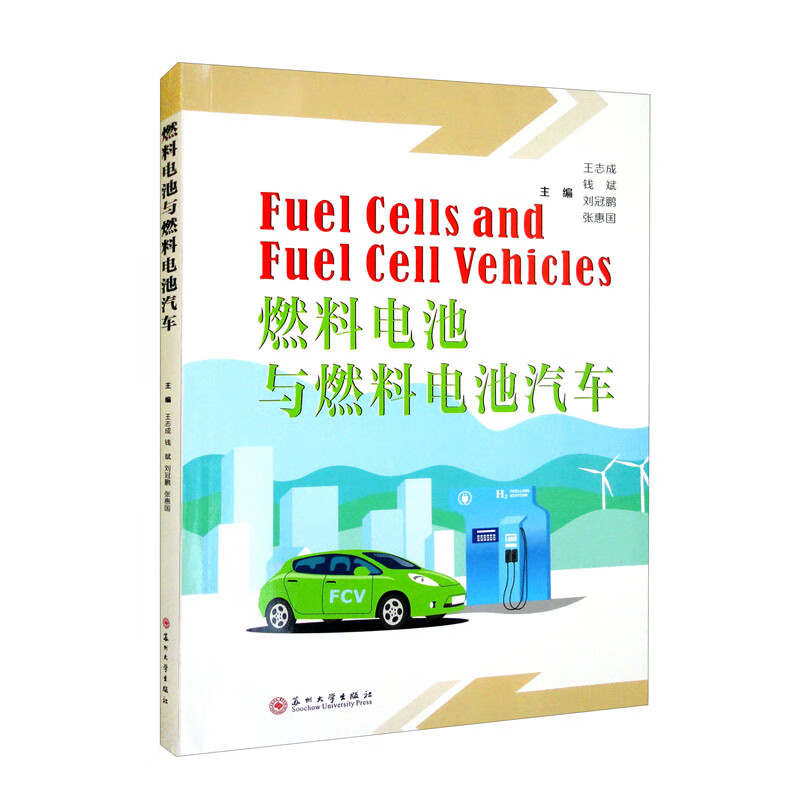- ISBN:9787567238886
- 装帧:一般胶版纸
- 册数:暂无
- 重量:暂无
- 开本:24cm
- 页数:263页
- 出版时间:2022-06-01
- 条形码:9787567238886 ; 978-7-5672-3888-6
内容简介
Fuel cell(FC)is an effective and environmentally friendly electrochemical power generation device, which can directly convert the chemical energy of fuel and oxidant into electric energy. Nowadays, with the increasingly serious problems of environmental pollution and energy shortage, the research & development(R&D)and application of FC technology have attracted more and more attention from governments and researchers worldwide, Compared with other types of new energy vehicles, fuel cell vehicles(FCVs)have apparent advantages. Hence, with the development of research & development and engineering of the hydrogen preparation, storage, transportation, and application of hydrogen and the breakthroughs in FC retaled technologies, FCVs will have a more important position and broad prospects in developing new energy vehicles in the future. With the gradual practicality and marketization of FCVs, there will be more and more demand for personnel engaged in the design and manufacture, operation and maintenance, sales and promotion of FCVs. Therefore, it is urgent to cultivate engineering and technical talents to adapt to the fast growth of industry. The book is written under this background. The book consists of 5 chapters. Chapter 1 is compiled by Wang Zhicheng, which mainly introduces the working principle, classification, development history, characteristics, and application of FCs. Chapter 2 is compiled by Qian Bin to mainly present the electrochemical basis, polarization and the test method for polarization of FCs. Chapter 3 is compiled by Wang Zhicheng and Liu Guanpeng, which mainly introduces six FC types and emphasizes proton exchange membrane fuel cell(PEMFC), solid oxide fuel cell(SOFC)and alkaline fuel cell(AFC). Chapter 4 is compiled by Wang Zhicheng to mainly introduce the preparation, purification and storage of hydrogen for FC. Chapter 5 is compiled by Zhang Huiguo and Wang Zhicheng to mainly present the knowledge and the infrastructure facilities relating to FCVs. Wang Zhicheng is in charge of the final compilation and editing of the whole book.
目录
1.1 Working Principle of Fuel Cell
1.2 Classification of Fuel Cell
1.3 Development History of Fuel Cell
1.4 Characteristics of Fuel Cell
1.5 Application of Fuel Cell
References
Chapter 2 Electrochemical Basis of Fuel Cell
2.1 Fuel Cell Thermodynamics
2.1.1 Relationship Between Gibbs Free Energy and Electromotive Force of Cell
2.1.2 Nernst Equation
2.1.3 FC Efficiency
2.2 Kinetics of Electrode Process
2.2.1 Faraday's Law and Electrochemical Process Rate
2.2.2 Electrochemical Reaction Rate
2.3 Polarization
2.3.1 Electrochemical Polarization
2.3.2 Concentration Polarization
2.3.3 Ohmic Polarization
2.4 Polarization Test
References
Chapter 3 Fuel Cell Type
3.1 Proton Exchange Membrane Fuel Cell
3.1.1 Structure and Working Principle of PEMFC
3.1.2 Development History of PEMFC
3.1.3 Main Components of PEMFC
3.1.4 Single Cell and Cell Stack of PEMFC
3.1.5 Analysis of PEMFC Stack Failure
3.2 Direct Methanol Fuel Cell
3.2.1 Structure and Working Principle of DMFC
3.2.2 Key Materials of DMFC
3.2.3 Differences Between DMFC and PEMFC
3.2.4 Existing Problems of DMFC
3.2.5 Application of DMFC
3.3 Solid Oxide Fuel Cell
3.3.1 Structure and Working Principle of SOFC
3.3.2 Development Overview of SOFC
3.3.3 Key Materials of SOFC
3.3.4 Development Trend of SOFC
3.3.5 Problems of SOFC
3.3.6 SOFC Stack
3.3.7 High Power Density SOFC
3.4 Alkaline Fuel Cell
3.4.1 Structure and Working Principle of AFC
3.4.2 Development Overview of AFC
3.4.3 Key Materials of AFC
3.4.4 Drainage of AFC
3.4.5 Advantages and Disadvantages of AFC
3.4.6 Single Cell and Cell Stack of AFC
3.5 Phosphoric Acid Fuel Cell
3.5.1 Structure and Working Principle of PAFC
3.5.2 Development Overview of PAFC
3.5.3 PAFC Materials
3.5.4 PAFC Stack
3.5.5 Factors Affecting PAFC
3.5.6 Factors Affecting Lifetime and Improvement Methods
3.5.7 Advantages and Disadvantages of PAFC
3.6 Molten Carbonate Fuel Cell
3.6.1 Structure and Working Principle of MCFC
3.6.2 Development Overview of MCFC
3.6.3 Key Materials of MCFC
……
Chapter 4 Preparation, Purification and Storage of Hydrogen Fuel for Fuel Cells
Chapter 5 Fuel Cell Vehicle
Acronyms
-

铁道之旅:19世纪空间与时间的工业化
¥20.7¥59.0 -

金属材料及热处理
¥46.1¥72.0 -

中国传统民俗文化:建筑系列:中国古代桥梁
¥20.9¥58.0 -

嗨印刷工艺(Vol1烫印)(精)
¥147.4¥268.0 -

西门子S7-1200 PLC项目化教程
¥39.4¥54.0 -

装配化工字组合梁设计
¥88.0¥160.0 -

高聚物粘结及其性能
¥34.8¥120.0 -

汽车风云人物
¥13.5¥50.0 -

品牌鞋靴产品策划-从创意到产品
¥26.5¥42.0 -

城市桥梁工程施工与质量验收手册-(含光盘)
¥61.6¥78.0 -

城镇道路工程施工与质量验收规范实施手册
¥16.4¥39.0 -

长江航运文化
¥21.2¥46.0 -

航空发动机限寿件概率损伤容限评估概述
¥67.8¥88.0 -

天才武器
¥42.0¥60.0 -

中国再制造进展
¥88.5¥118.0 -

中国烹饪工艺学粤菜教程
¥48.4¥59.8 -

蓝色水星球 重新思考我们在宇宙中的家园
¥60.7¥88.0 -

面对盖娅:新气候制度八讲
¥69.0¥92.0 -

机械制图
¥37.4¥68.0 -

服饰造型讲座:4:外套·背心
¥37.1¥58.0













